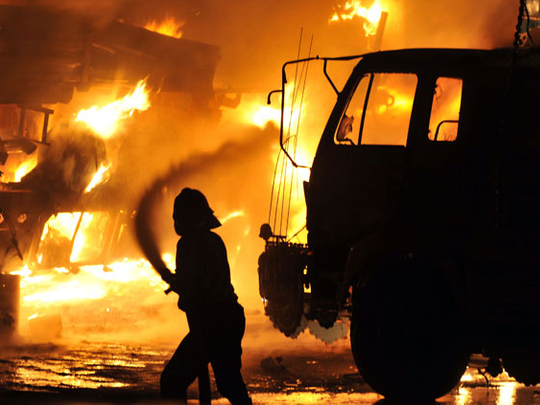
Pakistan's security challenges may be profound but the past week has reinforced an often downplayed global dimension to the issue.
A group of militants armed with weapons simply stormed into a depot outside the capital city of Islamabad where at least 50 trucks carrying fuel and supplies for Afghanistan-based Nato forces were parked.
Within minutes, volleys of gunfire targeting trucks filled with fuel triggered one of the largest fire incidents Islamabad has seen. By the time the rescue services arrived and the militants fled the scene, at least seven people were killed.
In the heat of the moment, the attack which adds to a large number of other terror-related incidents, will be seen as simply another bit of evidence suggesting the mounting challenge Pakistan faces. It may be so.
Replenished
But the motive in this case was to hurt the US-led western effort to secure Afghanistan. While the western world may publicly pretend that lost supplies can easily be replenished, the facts may be different from what appears on the surface.
The reality is that each such attack brings home a sense of achievement for the militants and convinces them more than before that their effort is strengthening. Each such victory, no matter how small, kicks in a sense of accomplishment along with the determination to seek out a new target.
It is also true that such blatant attacks demonstrate the holes in the US-led effort to win the war in Afghanistan. Historically, such unconventional conflicts anywhere in the world have repeatedly demonstrated the disadvantage on the side of regular militaries in prevailing upon often invisible enemies.
For Pakistan, the past two years have seen a consistent escalation of this conflict as the battle to save the soul of the country has intensified. In spite of a growing number of engagements between the Pakistani military and groups of terrorists, the fight goes on and does not show signs of coming to an end.
One key danger, however, is that this conflict will in time be seen as largely Pakistan's own fight rather than a global one. To some extent, that point has already figured in part of the discourse when policy-making circles in the western world have drawn attention to the country's past links with militant groups while also proclaiming support.
Lip service
Another key danger is that the fight has squarely been seen as a military one, devoid of the wider challenge of tackling some of Pakistan's more troubling issues. On top of the list of such issues must be the challenges facing the country's economy and governance.
While the global community has paid ample lip service in support of Pakistan's economic needs, there continues to be two significant gaps in their approach.
On the one hand, promises made to help the country have not always translated into reality. A widely quoted case is that of the more than $5 billion (Dh18.39 billion) promised to Pakistan by the so-called Friends Of Democratic Pakistan not one dime has actually been delivered. Similarly, US promises to support the creation of ROZs or Reconstruction Opportunity Zones along the border with Afghanistan, have been on the table for several years. The bottom line is indeed that across Pakistan, broken or delayed promises are seen as unfulfilled.
For the western world, which says that it is essential to defeat Al Qaida and the Taliban in the Afghanistan-Pakistan region, it is essential not only to support the armed forces but also vital to intervene in areas related to its economic welfare with the intention of benefiting the poorest of the poor.
In this background, the latest attack on the Nato convoy outside Islamabad can present itself as an opportunity to conclude that Pakistan remains increasingly on the defensive.
However, it would be far more productive as an exercise to build up on the attack as an opportunity to renew Pakistan's determination, both in conventional military terms and in economic terms, to fight the menacing challenges that it faces — a battle that is indeed the world's own rather than that of just one country.
Farhan Bokhari is a Pakistan-based commentator who writes on political and economic matters.










